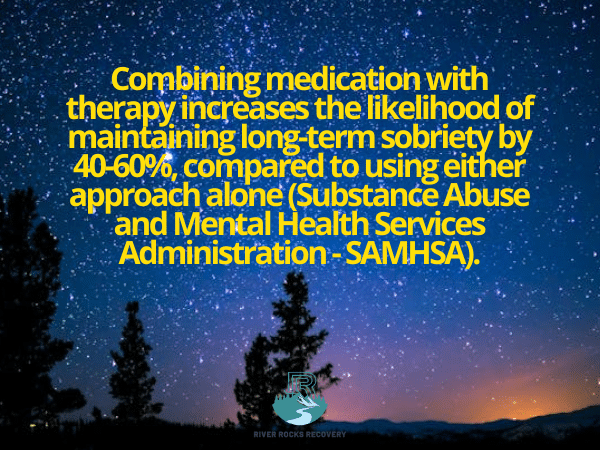Treating alcohol addiction requires a comprehensive approach that addresses both the physical and psychological aspects of dependency. For many individuals, a combination of therapy and medication proves to be the most effective strategy for achieving and maintaining long-term sobriety. Therapy focuses on the emotional and behavioral causes of addiction, while medication assists in reducing cravings, managing withdrawal symptoms, and preventing relapse. Together, these methods provide a holistic path to recovery.
This dual approach provides a holistic path to recovery by addressing both the physical and psychological aspects of addiction. Here’s a closer look at how therapy and drugs combine to help people reclaim their lives.
The Benefits of Combining Therapy and Medication
Using therapy and medication together offers several advantages, as they address different but complementary aspects of recovery.
1. Comprehensive Care
- Therapy addresses the psychological and emotional aspects of addiction, while medication tackles the physical components.
- This dual approach ensures that no part of the addiction is overlooked.
2. Higher Success Rates
- Studies show that individuals who receive both therapy and medication are significantly more likely to achieve long-term sobriety compared to those who use only one method.
3. Improved Quality of Life
- By reducing cravings and withdrawal symptoms, medication allows individuals to focus fully on therapy and rebuilding their lives.
4. Lower Risk of Relapse
- Therapy equips individuals with the skills to handle triggers and stress, while medication reduces the likelihood of physical relapse due to cravings or dependence.
The Role of Therapy in Alcohol Treatment Programs
Therapy is a cornerstone of alcohol treatment, offering individuals the opportunity to understand and address the underlying causes of their addiction. It also equips them with coping strategies and emotional support for long-term sobriety.
1. Addressing Root Causes
Therapy helps individuals identify the emotional, psychological, or environmental factors contributing to their alcohol use. These may include:
- Trauma or PTSD
- Co-occurring mental health conditions such as depression or anxiety
- Family or relationship issues
- Stress from work, finances, or other life challenges
2. Developing Healthy Coping Mechanisms
Many individuals use alcohol as a way to cope with negative emotions or stress. Therapy teaches healthier alternatives, such as mindfulness, exercise, or effective communication skills.
3. Strengthening Emotional Resilience
Through therapy, individuals build emotional resilience, making them less susceptible to triggers and cravings.
Common Therapy Methods in Alcohol Treatment
- Cognitive Behavioral Therapy (CBT): Helps individuals identify and change negative thought patterns that lead to alcohol use.
- Dialectical Behavior Therapy (DBT): Focuses on emotional regulation and interpersonal skills.
- Motivational Interviewing (MI): Encourages individuals to explore their own motivations for sobriety.
- Family Therapy: Involves loved ones in the recovery process to rebuild trust and improve communication.
The Importance of Therapy in Alcohol Treatment
Therapy is essential for identifying the underlying reasons for alcoholism. It gives people strategies to handle triggers, deal with stress, and reconstruct their lives without relying on alcohol. Several therapy methods can be used, including:
1. Cognitive-Behavioral Therapy (CBT)
CBT focuses on recognizing and modifying negative cognitive processes that lead to alcohol consumption. It assists individuals in developing healthy coping skills and understanding the relationship between their ideas, emotions, and behaviors
2. Motivational Interviewing (MI)
MI is a client-centred method that tries to enhance motivation for change. It encourages people to confront their ambivalence about stopping alcohol and strengthens their will to recover.
3. Group Therapy
Shared experiences and struggles in a supportive group setting can promote connection and lessen feelings of isolation. Group therapy allows members to learn from one another while being encouraged and held accountable.
4. Family therapy
Family therapy helps to mend relationships, increase communication, and foster a supportive environment favorable to rehabilitation.
Medication as a Supportive Tool in Alcohol Recovery.
Medication can considerably improve the efficacy of therapy by targeting the physiological components of addiction. Commonly used drugs include:
- Disulfiram: Disulfiram causes an unfavorable reaction when alcohol is consumed, preventing people from drinking. It serves as a potent behavioral reinforcer.
- Naltrexone: This drug suppresses alcohol’s pleasurable effects, reducing cravings and the desire to drink. You can consume it as a tablet or an injection.
- Acamprosate: Acamprosate helps to restore brain chemistry altered by persistent alcohol consumption, alleviating withdrawal symptoms and lowering the chance of recurrence.
- Medications for Co-occurring Disorders: Many people who are addicted to alcohol suffer from anxiety, depression, and other mental health concerns. Medications for these illnesses can boost overall well-being and aid healing.

How River Rocks Recovery Combines Therapy and Medication
At River Rocks Recovery, we believe that every individual deserves a treatment plan tailored to their unique needs. Our programs combine therapy and medication to provide holistic care.
1. Comprehensive Assessment
- We begin with a thorough assessment of each individual’s physical, emotional, and psychological health.
- This helps us determine which therapies and medications are most appropriate for their recovery journey.
2. Integrated Treatment Plans
- Our programs integrate therapy and medication seamlessly, ensuring that both approaches work together to support the individual’s goals.
3. Medical Supervision
- Medications are prescribed and monitored by experienced medical professionals to ensure safety and effectiveness.
4. Therapy Options
- We offer individual therapy, group therapy, and family therapy to address all aspects of addiction and recovery.
5. Flexible Levels of Care
- Partial Hospitalization Program (PHP): Ideal for individuals who need intensive care but do not require 24/7 supervision.
- Intensive Outpatient Program (IOP): Offers flexibility for individuals balancing recovery with daily responsibilities.
- Outpatient Program: Provides ongoing support for those transitioning from higher levels of care.
- Sober Living Program: A structured, substance-free environment that supports long-term recovery.
The Synergy of Combining Therapy and Medication
When combined, therapy and medicine provide a powerful synergy in alcohol recovery programs. Here’s how:
- Addressing Root Causes: Therapy focuses on the psychological and emotional causes of addiction, whereas medication addresses the physical alcohol dependence.
- Reducing Relapse Risks: Medications minimize cravings and withdrawal symptoms, making it simpler for people to continue participating in therapy and recovery programs.
- Supporting Long-Term Recovery: Therapy teaches people life skills and coping techniques, whereas medicine provides a safety net during the early, vulnerable stages of recovery.
River Rocks Recovery: Your partner in comprehensive alcohol treatment!
If you or a loved one is battling with alcoholism, you do not have to do it alone. River Rocks Recovery specializes in providing holistic, evidence-based treatment programs that are tailored to your specific needs. Our staff blends cutting-edge therapeutic approaches and medication management to provide you with the finest possible care.
River Rocks Recovery, located in a peaceful and loving environment, is committed to empowering people to overcome addiction and live fulfilling, alcohol-free lives. Whether you require detox support, individual treatment, or ongoing outpatient care, we are here to help you every step of the way.
Contact River Rocks Recovery today to find out more about our addiction treatment programs. Our team is available 24/7 to achieve long-term recovery goals. So, what are you waiting for now?
Conclusion
Overcoming alcohol addiction requires a multifaceted approach, and combining therapy with medication is one of the most effective strategies. By addressing both the psychological and physical components of addiction, this integrated approach provides individuals with the tools they need to achieve and maintain sobriety.
At River Rocks Recovery, we are committed to helping individuals build a healthier, alcohol-free future through comprehensive care. Call us today at (888) 905-6281 to learn more about our programs and take the first step toward recovery.
FAQ for Combining Therapy and Medication
Why combine therapy and medication in alcohol treatment?
Combining therapy and medication addresses both the psychological and physical aspects of addiction, offering a comprehensive approach that improves recovery outcomes.
What types of therapy are used in alcohol treatment programs?
Therapies like Cognitive Behavioral Therapy (CBT), Dialectical Behavior Therapy (DBT), Motivational Interviewing (MI), and family therapy are commonly used to address emotional and behavioral issues.
What medications are used to treat alcohol addiction?
Common medications include Disulfiram (Antabuse), Naltrexone (Vivitrol), and Acamprosate (Campral), which help reduce cravings, withdrawal symptoms, and the risk of relapse.
Are medications safe for alcohol treatment?
Yes, medications prescribed in professional treatment programs are safe and monitored by medical professionals to ensure effectiveness and safety.
Does River Rocks Recovery offer integrated treatment?
Yes, River Rocks Recovery combines evidence-based therapies and medication management in personalized treatment plans, tailored to each individual’s needs.




























